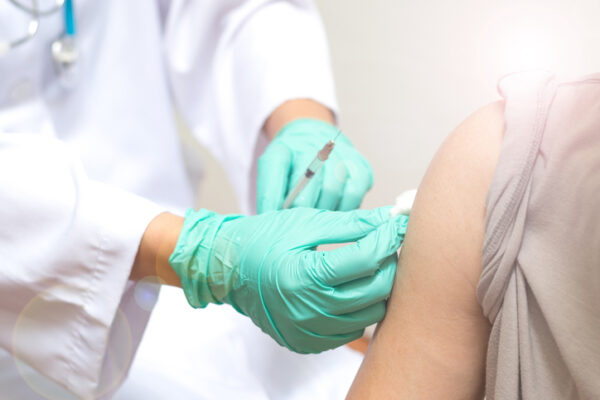
The first data from a clinical trial of a vaccine against the virus that causes Covid-19 indicate that it is effective, the company developing it said Monday.
Cambridge, Massachusetts-based Moderna announced the release of interim data from the Phase I study of mRNA-1273, its messenger RNA-based vaccine against the SARS-CoV-2 virus. The study is being run by the National Institute of Allergy and Infectious Diseases.
The data include participants receiving the vaccine in priming and booster doses at 25 or 100 micrograms and after a single dose of 250 micrograms. In each of the 15-person cohorts, all participants seroconverted by the two-week mark after a single dose of vaccine.
Among the first four participants receiving the 25-microgram dose, neutralizing antibodies against SARS-CoV-2 were at a level comparable to those seen in blood samples from patients who had recovered from Covid-19, while in the first four among the 100-microgram cohort, levels exceeded those in recovered patients.
Shares of Moderna were up more than 30% on the Nasdaq in premarket trading following the news. They closed at $80 per share, up 20% from their Friday closing price.
An additional preclinical study in mice conducted by NIAID showed that vaccination with mRNA-1273 prevented viral replication in the lungs of animals challenged with the virus, with neutralizing concentrations of antibodies that were protective in the mice being at levels similar to those achieved by human participants in the 105-participant Phase I study.

A Deep-dive Into Specialty Pharma
A specialty drug is a class of prescription medications used to treat complex, chronic or rare medical conditions. Although this classification was originally intended to define the treatment of rare, also termed “orphan” diseases, affecting fewer than 200,000 people in the US, more recently, specialty drugs have emerged as the cornerstone of treatment for chronic and complex diseases such as cancer, autoimmune conditions, diabetes, hepatitis C, and HIV/AIDS.
“These interim Phase I data, while early, demonstrate that vaccination with mRNA-1273 elicits an immune response of the magnitude caused by natural infection starting with a dose as low as 25 micrograms,” Moderna chief medical officer Tal Zaks said in a statement. “When combined with the success in preventing viral replication in the lungs of a preclinical challenge model at a dose that elicited similar levels of neutralizing antibodies, these data substantiate our belief that mRNA-1273 has potential to prevent Covid-19 disease and advance our ability to select a dose for pivotal trials.”
The company has received the go-ahead from the Food and Drug Administration to start its Phase II study of the vaccine, and it plans to initiate a Phase III trial in July. In a presentation for investors Monday morning, the company noted that the Phase II study – scheduled to begin this quarter – would randomize participants to receive either placebo or vaccine at 50 or 100 micrograms. The Phase III study will use a dose of between 25 and 100 micrograms.
Another company, Tianjin, China-based CanSino Biologics, already has a Phase II study underway and said last week it would begin clinical testing of its vaccine in Canada. Pfizer and BioNTech are also partnering on a messenger RNA-based vaccine and recently entered their product candidate into the clinic.
Still, controversy arose over the weekend when Business Insider reported that Moncef Slaoui, a former pharmaceutical industry executive whom the Trump administration had tapped earlier this month to lead vaccine development efforts, holds stock options in Moderna worth more than $10 million. The Biomedical Advanced Research and Development Authority, part of the Department of Health and Human Services, has committed up to $483 million in funding to Moderna to cover the cost of the vaccine’s development through registration.
Photo: Pornpak Khunatorn, Getty Images













